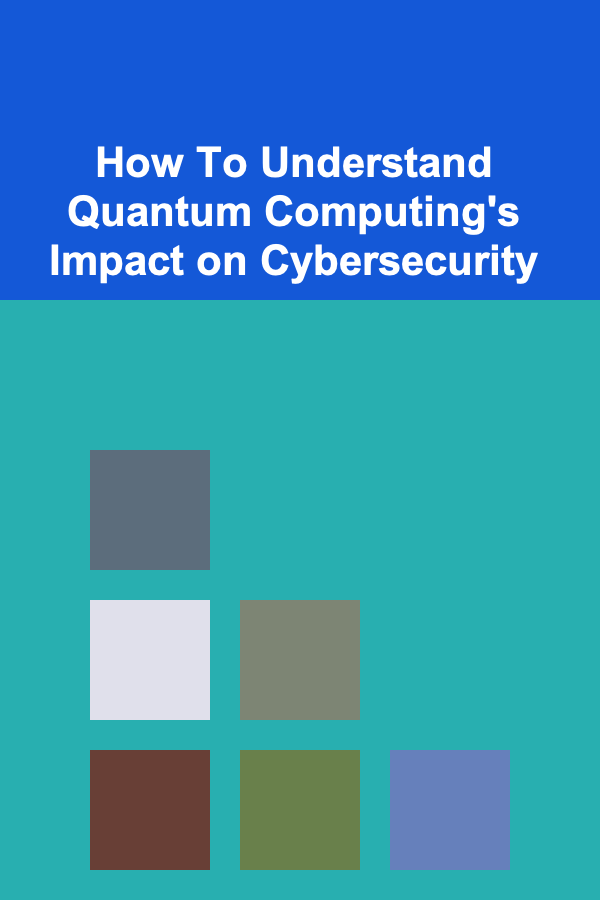
How To Understand Quantum Computing's Impact on Cybersecurity
ebook include PDF & Audio bundle (Micro Guide)
$12.99$8.99
Limited Time Offer! Order within the next:

Quantum computing is one of the most revolutionary developments in modern science, poised to change the landscape of various industries, particularly cybersecurity. At its core, quantum computing challenges our conventional understanding of computation and encryption, raising fundamental questions about data security, privacy, and protection against cyber threats. As we delve deeper into the future of technology, it's essential to explore how quantum computing will affect cybersecurity --- both its potential to enhance security measures and the vulnerabilities it introduces.
In this article, we will break down the basics of quantum computing, explain its impact on cybersecurity, discuss the challenges it presents, and highlight the potential future of cybersecurity in a quantum world.
Understanding Quantum Computing
To understand quantum computing's impact on cybersecurity, we first need to grasp the basics of quantum computing itself. Unlike classical computers, which use bits to store data as either a 0 or a 1, quantum computers use quantum bits, or qubits. Qubits can represent and store data as both 0 and 1 simultaneously, thanks to a principle called superposition. This allows quantum computers to perform many calculations at once, dramatically speeding up problem-solving processes for certain complex tasks.
Key Quantum Concepts in Computing
- Superposition: In classical computing, a bit can be either 0 or 1. However, in quantum computing, a qubit can be both 0 and 1 at the same time. This exponential capability allows quantum computers to perform multiple calculations in parallel.
- Entanglement: Entanglement is another fundamental principle of quantum mechanics that allows qubits to be correlated with one another, even across large distances. When qubits are entangled, changing the state of one qubit instantaneously changes the state of the other, which could have profound implications for data transmission and security.
- Quantum Interference: This phenomenon occurs when quantum states amplify or cancel each other out, depending on the paths of quantum waves. By carefully manipulating quantum interference, quantum computers can enhance computation accuracy and solve certain problems much faster than classical computers.
These principles allow quantum computers to process and analyze vast amounts of data in ways that classical computers cannot, making them extremely powerful. However, the same features that make quantum computers powerful also make them a potential threat to the security of digital information.
The Implications of Quantum Computing on Cybersecurity
Quantum computing will have a profound effect on cybersecurity, primarily by undermining the security of current cryptographic systems. The encryption algorithms that secure much of today's digital communication rely on the difficulty of factoring large numbers or solving complex mathematical problems. These systems, such as RSA encryption and Elliptic Curve Cryptography (ECC), are designed to be computationally infeasible for classical computers to break.
However, quantum computers, using Shor's algorithm, could solve these problems exponentially faster than classical computers. Shor's algorithm is a quantum algorithm that can efficiently factor large numbers, rendering current encryption methods obsolete. In a world where quantum computers are widely available, the foundation of most internet security systems could be completely compromised.
Potential Threats to Cryptographic Systems
- RSA Encryption: RSA encryption, a cornerstone of modern digital security, relies on the difficulty of factoring large numbers. A quantum computer using Shor's algorithm could factor these numbers in polynomial time, breaking the encryption and exposing sensitive information.
- Elliptic Curve Cryptography (ECC): ECC is widely used in systems like TLS/SSL and mobile applications. Quantum computers could break ECC with the same efficiency as RSA, jeopardizing the security of mobile devices, financial institutions, and online transactions.
- Symmetric-Key Cryptography : Symmetric-key algorithms, like AES (Advanced Encryption Standard) , are less vulnerable to quantum attacks, but they are not entirely immune. Quantum algorithms like Grover's algorithm could reduce the security of symmetric-key systems, potentially requiring a doubling of key lengths to maintain the same level of security.
- Digital Signatures: Many systems rely on digital signatures for authentication. Quantum computing's ability to break traditional encryption could lead to the forgeries of digital signatures and undermine trust in digital systems.
The risk of quantum computers breaking existing encryption algorithms is not just theoretical. As quantum technology advances, these vulnerabilities are expected to become more pronounced, threatening everything from government communications to personal banking and private data storage.
The Rise of Post-Quantum Cryptography (PQC)
As quantum computing threatens to render current cryptographic algorithms obsolete, the field of post-quantum cryptography (PQC) has emerged as a solution. PQC refers to cryptographic algorithms that are resistant to the potential threats posed by quantum computers. These algorithms aim to protect sensitive information from quantum attacks while remaining secure against classical computer attacks.
The primary goal of PQC is to develop algorithms that are not vulnerable to Shor's algorithm or Grover's algorithm. The National Institute of Standards and Technology (NIST) has been leading an effort to standardize quantum-resistant algorithms for widespread adoption. In 2022, NIST selected several algorithms for standardization, including Kyber , NTRU , FrodoKEM, and others, which are believed to be resistant to quantum attacks.
Key Areas of Focus in Post-Quantum Cryptography
- Lattice-based Cryptography: One of the most promising families of quantum-resistant algorithms is lattice-based cryptography. Lattice-based systems rely on mathematical structures called lattices, which are believed to be difficult for quantum computers to solve. These algorithms are considered highly secure against quantum attacks.
- Code-based Cryptography: Code-based cryptography is another approach to creating quantum-resistant algorithms. This method uses error-correcting codes to ensure data remains secure, even against quantum computing attacks. While not as widely studied as lattice-based methods, it holds significant promise for securing digital systems.
- Multivariate Quadratic Equations (MQ): MQ cryptography involves solving systems of multivariate quadratic equations. While it offers potential security against quantum attacks, its implementation is still under active research.
- Hash-based Cryptography: This category includes digital signature schemes based on hash functions. Hash-based signatures are believed to be resistant to quantum attacks, and they are one of the few quantum-resistant methods that are already in use today.
- Isogeny-based Cryptography: Isogeny-based cryptography relies on the mathematical concept of isogenies between elliptic curves. Although still in the early stages of research, isogeny-based schemes show promise for securing digital systems in a quantum world.
The development of PQC is a work in progress, and the migration from current cryptographic systems to quantum-resistant alternatives will require careful planning, testing, and deployment.
The Cybersecurity Landscape in a Quantum World
As quantum computing becomes more practical and widespread, its impact on cybersecurity will be profound. Both governments and private organizations will need to adapt to the changing landscape by adopting quantum-resistant technologies. However, the transition will not be immediate, and there are several challenges that must be addressed.
Challenges in Transitioning to Quantum-Resistant Systems
- Legacy Systems: Many organizations rely on legacy systems that cannot easily be updated to support quantum-resistant cryptography. Transitioning these systems to PQC could be costly and time-consuming.
- Compatibility Issues: As new cryptographic standards are developed, it will be essential to ensure compatibility between existing and future systems. This may require the development of hybrid systems that combine classical and quantum-resistant cryptographic algorithms.
- Scalability: Post-quantum cryptographic algorithms need to be efficient and scalable to handle the vast amounts of data that are processed daily. Researchers are working on optimizing these algorithms for real-world applications, but this remains a significant challenge.
- Government Regulation: Governments will play a crucial role in regulating and promoting the adoption of quantum-resistant technologies. International cooperation will be essential to create global standards and prevent cybercrime in a quantum world.
The Potential for Quantum-Enhanced Cybersecurity
Despite the threats that quantum computing poses to traditional cybersecurity, it also offers the potential to enhance security in new and innovative ways. One of the most exciting prospects for quantum-enhanced cybersecurity is quantum key distribution (QKD).
Quantum Key Distribution (QKD)
QKD leverages the principles of quantum mechanics to create unbreakable encryption keys. By using entangled qubits, QKD allows two parties to exchange encryption keys securely. Any attempt by a third party to intercept the key will alter the quantum state of the key, immediately revealing the intrusion. This creates a level of security that classical encryption systems cannot achieve.
Several companies and governments have already begun deploying QKD in limited applications, such as secure communications between military units or financial institutions. As quantum technology advances, the use of QKD could expand to broader applications, creating a new paradigm of cybersecurity.
Conclusion
Quantum computing is a double-edged sword for cybersecurity. On the one hand, it threatens to render current cryptographic systems obsolete, putting at risk the security of the digital world. On the other hand, quantum technologies such as quantum key distribution offer new methods for securing data in ways that were previously impossible.
To address the risks posed by quantum computing, researchers are focused on developing post-quantum cryptography and transitioning to quantum-resistant systems. While the migration to quantum-resistant technologies is still in its early stages, the progress being made is promising.
As quantum computing evolves, so too will the strategies and technologies designed to protect our digital world. By embracing innovation and preparing for the quantum era, we can ensure that cybersecurity remains robust in the face of this transformative technology.

How to Develop a Data Migration Checklist for Software Implementation
Read More
How to Ensure Your Rental Property is Up to Code
Read More
How to Make Your Home Feel Cozy with Budget-Friendly Decor
Read More
How to Organize Photos After an Event Quickly
Read More
How to Sell Used Camera Lenses on Facebook Marketplace: An Actionable Guide
Read More
How To Understand the Role of Agents in Esports
Read MoreOther Products

How to Develop a Data Migration Checklist for Software Implementation
Read More
How to Ensure Your Rental Property is Up to Code
Read More
How to Make Your Home Feel Cozy with Budget-Friendly Decor
Read More
How to Organize Photos After an Event Quickly
Read More
How to Sell Used Camera Lenses on Facebook Marketplace: An Actionable Guide
Read More